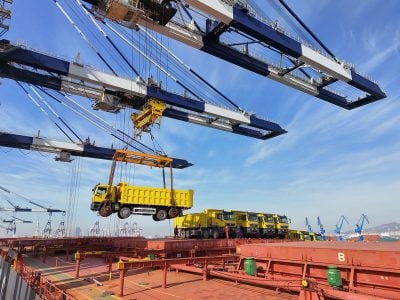Japan provides development assistance to a number of countries in Africa. Tom Collins spoke to representatives of the Japan International Cooperation Agency (JICA) to find out about its activities in Kenya, the agency’s biggest recipient on the continent.
Known as the “living room of Africa”, Kenya has long been a preferred destination for those looking to interact with the continent. With resilient markets, stable democracy and a growing middle class, the East African donor darling routinely attracts some of the largest sums of official development assistance (ODA) from Africa’s increasing list of partners.
According to the Organisation for Economic Cooperation and Development (OECD), Kenya received the fourth largest share of ODA in 2016 behind only Tanzania, Nigeria and Ethiopia. Japan is keen to support this trend and Kenya has become its largest recipient on the continent. The Japan International Cooperation Agency (JICA), Japan’s development organisation, has its largest African office in the Kenyan capital of Nairobi, employing over 60 staff.
Between April 2016 and March 2017, JICA, acting as a key conduit to Japanese interest, helped the Japanese government invest around $180m in Kenya. JICA distinguishes itself by the quality of its projects, which are designed to complement the development mandate of Kenya’s president, Uhuru Kenyatta.
Almost halfway through his second term, President Kenyatta is racing to finish what he hopes will define his presidency: the big four agenda of manufacturing, affordable housing, universal health coverage and food security. JICA officials tell African Business in Nairobi that Japan has been focusing on these four areas.
“We cannot cover everything,” says senior representative Satoshi Sugimoto. “But we try to pick up the high priority projects which complement the government at a local, national and county level.”
The Northern Corridor transport system, which links Kenya’s coastal port of Mombasa with Uganda and Rwanda, is one such project. The route is a key pillar of the government’s development strategy as it works to make Kenya a transit hub for regional goods. JICA is expanding Mombasa’s second container terminal and enhancing the road capacity to access the port. Elsewhere, the development agency is working to facilitate trade by building and enhancing one-stop border posts (OSBPS), the most recent of which is at Namanga on the Tanzanian border.
With limited public funds, JICA also believes it must act as a “catalyst” for the private sector. Japanese companies perform very well in construction and the red and white of the Japanese flag is easily spotted around the capital at key building sites. As the downtown traffic heads out to suburban areas such as Karen, a Japanese firm is in charge of renovating one of Nairobi’s most congested areas – Ngong Road. Kaihastu Kogyo was awarded the $22.3m contract by the Kenyan Urban Roads Authority last year.
Sugimoto says Japan’s distinctive approach to work gives its companies and its development agency a positive brand image, which may translate into a competitive advantage when bidding for contracts. Kaizen, which means “improve” in Japanese, is the guiding principle for most JICA activities. Along with the literal translation, the word exposes subtleties of the Japanese modus operandi which prefers a slow and steady approach towards a quality finish rather than a rushed project.
“It’s very important to see infrastructure projects in the medium to long terms,” says Sugimoto. “Even if it’s one to two years for the construction this is much better than a quick fix. The high quality will contribute of the finished product will contribute to economic and social development in the longer term.”
Investing in education
As well as investments in physical assets, JICA also focuses on the grey matter. At the fifth Tokyo International Conference on African Development (TICAD) in 2013, Japanese Prime Minister Shinzo Abe announced the African Business Education (ABE) Initiative.
The programme gives African youth the chance to study a master’s degree at a Japanese university along with an internship in a Japanese company. A total of 154 Kenyans have taken part so far and another five are expected to arrive in Japan later this year, making Kenya the largest beneficiary of the ABE Initiative in Africa. Japanese professionals are encouraged to come and work in the Kenyan private sector in return. Sugimoto explains how these exchanges are key for overcoming stereotypes and ultimately for encouraging the Japanese private sector to enter the Kenyan market.
“It’s important to disseminate what the real political and economic situation in Africa is,” says Sugimoto. “Because in Japan many people have a limited understanding of what is happening in Africa.”
Shinjiro Amameishi, Sugimoto’s colleague and fellow senior representative, says that despite the lack of information there has been increased interest from the private sector over the past decade.
“I’ve been involved with African development for around 10 years and 10 years ago it was really different,” he says. “The investment from the private sector was limited but now they have started looking at Africa as a market. They started in the 2000s with original interest in mining, oil and gas, and coal. Now they are changing from mining to business activities. There is a big potential here in Kenya as the gateway to Africa.”
JICA is also a key benefactor of the Jomo Kenyatta University of Agriculture and Technology (JKUAT), says Amameishi. The institution provides state-of-the-art equipment for science, technology and innovation (STI) learning such as a 3D printer and a laser cutter. This high-tech aspect mirrors Japan’s reputation for one of the most technologically advanced countries in the world which could become a key area of collaboration going forward.
“JKUAT was founded 40 years ago by the assistance of the Japanese government,” says Amameishi. “We continue to provide assistance and it is has turned into a brilliant university.”
Abe effect
Since Abe entered office in 2012 there has been a concerted effort to open up Africa to Japan.
Katsutoshi Komori, JICA chief representative, says Kenya is a key priority within this mandate: “Kenya is a very high priority for the Japanese government. There are many Japanese here compared to other African countries and in terms of a diplomatic relationship we have had a very long relationship with the Kenyan government.”
Yet as Japan enters a recession, the appetite for development assistance is waning and JICA reveals there are “limited public resources”.
The representatives all agree that with reduced funding from Tokyo, the mantle now falls to the Japanese private sector to bolster JICA’s work in Kenya.
Want to continue reading? Subscribe today.
You've read all your free articles for this month! Subscribe now to enjoy full access to our content.
Digital Monthly
£8.00 / month
Receive full unlimited access to our articles, opinions, podcasts and more.
Digital Yearly
£70.00 / year
Our best value offer - save £26 and gain access to all of our digital content for an entire year!
 Sign in with Google
Sign in with Google 


